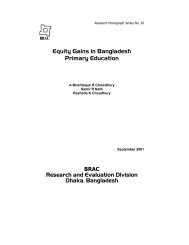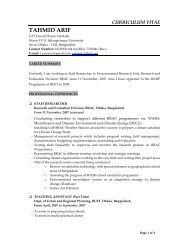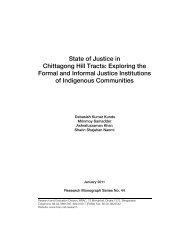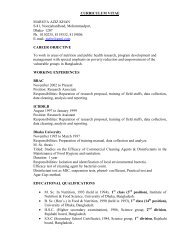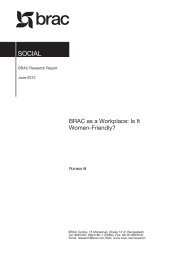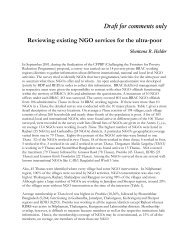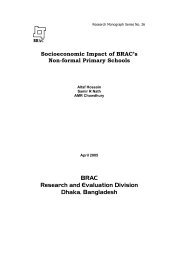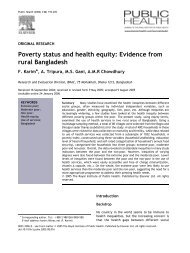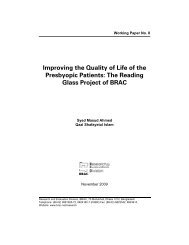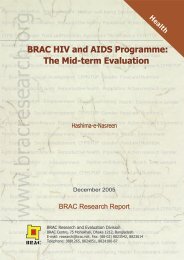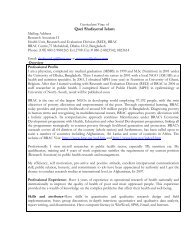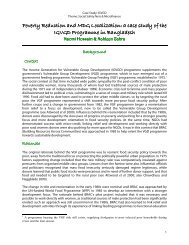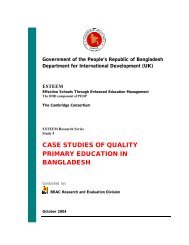Combining health and social protection measures to reach the ultra ...
Combining health and social protection measures to reach the ultra ...
Combining health and social protection measures to reach the ultra ...
You also want an ePaper? Increase the reach of your titles
YUMPU automatically turns print PDFs into web optimized ePapers that Google loves.
Decision-making<br />
harmonized with o<strong>the</strong>r government priorities? This is even<br />
more problematic when we consider that o<strong>the</strong>r areas of<br />
government spending e.g. education, housing, transport,<br />
may all impact on <strong>health</strong> in major ways.<br />
3. Would <strong>the</strong>re be more equitable access <strong>to</strong> <strong>health</strong> services if<br />
governance <strong>and</strong> decision-making were more open <strong>to</strong> input<br />
by community stakeholders? Ano<strong>the</strong>r aspect of this<br />
question of governance is: how can governments<br />
reasonably reorder priorities given <strong>the</strong> range of pressures<br />
on <strong>the</strong>ir available resources?<br />
4. Given <strong>the</strong> resource <strong>and</strong> o<strong>the</strong>r infrastructure constraints,<br />
particularly in poorer countries, what are <strong>the</strong> most<br />
appropriate <strong>health</strong> care delivery models for a country <strong>to</strong><br />
adopt?<br />
Given this possible research agenda, are <strong>the</strong>se questions<br />
capable of analysis that is likely <strong>to</strong> lead <strong>to</strong> useful outcomes?<br />
Are <strong>the</strong>y universal or is <strong>the</strong> specific context of local country<br />
considerations so dominant that no general conclusions can<br />
be drawn? Is <strong>the</strong>re political will <strong>to</strong> address this agenda, let<br />
alone tackle <strong>the</strong> problems on <strong>the</strong> ground?<br />
The first question, what is equity?, seems capable of<br />
answer, albeit not in a generalizable way. What people mean<br />
<strong>and</strong> want by equity could be established in specific contexts<br />
using focus groups <strong>and</strong> st<strong>and</strong>ard <strong>social</strong> research<br />
methodologies, for each level of government <strong>and</strong> decisionmaking.<br />
If people see equity of outcome as having primacy,<br />
<strong>the</strong>n simple equity around allocation will not be enough.<br />
Never<strong>the</strong>less, unless <strong>the</strong>re is some broad agreement on <strong>the</strong><br />
answer <strong>to</strong> this question for a given society, allocation of<br />
resources <strong>and</strong> planning of services is much more difficult.<br />
The second question, what is a reasonable amount <strong>to</strong><br />
invest in <strong>health</strong>? is more difficult. However data are or will be<br />
available on how much countries spend <strong>and</strong> on return on<br />
investment as determined by <strong>health</strong> metrics, status <strong>and</strong><br />
outcomes. The new institute for global <strong>health</strong> evaluations, <strong>the</strong><br />
Gates Foundation funded Health Metrics <strong>and</strong> Evaluation<br />
Institute at <strong>the</strong> University of Washing<strong>to</strong>n in Seattle should fill<br />
a critical gap by providing better information on <strong>health</strong><br />
metrics <strong>and</strong> <strong>health</strong> system performance 6 . These will include<br />
data on mortality, cause of death, disease <strong>and</strong> disability<br />
burden, risk fac<strong>to</strong>rs, resource flows <strong>and</strong> assessments of<br />
<strong>health</strong> systems 6 . We know that above a certain level of<br />
spending, <strong>health</strong> improvements are not evident, e.g. USA.<br />
Cuba on <strong>the</strong> o<strong>the</strong>r h<strong>and</strong> has excellent outcomes for modest<br />
spending. However, below a certain level of spending, <strong>health</strong><br />
status is poor <strong>and</strong> this is reflected in poor <strong>health</strong> outcomes for<br />
<strong>the</strong> poorest countries. It may be useful <strong>to</strong> compare country<br />
performance for like countries as a guide <strong>to</strong> allocative<br />
efficiency in a particular context. Analogous with <strong>the</strong><br />
Australian indigenous situation, some focus on <strong>health</strong><br />
outcomes would seem desirable particularly where <strong>the</strong>re are<br />
varying local ethnic, cultural, <strong>social</strong> or geographical fac<strong>to</strong>rs.<br />
The third set of questions address governance <strong>and</strong> how<br />
actual spending priorities are determined <strong>and</strong> set. Again,<br />
<strong>social</strong> <strong>and</strong> cultural fac<strong>to</strong>rs have primacy here, both in <strong>the</strong><br />
process for decision-making <strong>and</strong> in determining <strong>the</strong> particular<br />
value sets for identifying <strong>and</strong> respecting priorities. Some<br />
principles that might guide governance could include<br />
measurement of what is done <strong>and</strong> evaluation of what is<br />
achieved, along with openness <strong>and</strong> transparency of decision<br />
making, <strong>and</strong> a long-term commitment <strong>to</strong> agreed plans <strong>and</strong><br />
<strong>the</strong>ir implementation.<br />
The fourth question is very important in providing capacity<br />
<strong>to</strong> move forward within <strong>the</strong> constraints of available resources<br />
<strong>and</strong> competing priorities. For many countries a high<br />
technology <strong>health</strong> system is an unrealistic expectation even<br />
for <strong>the</strong> longer term. The priority will be in dealing with basic<br />
<strong>health</strong> needs <strong>and</strong> public <strong>health</strong> <strong>measures</strong>. Mullan <strong>and</strong><br />
Frehywot suggest, for example, that <strong>the</strong> use of non-physician<br />
clinicians in sub-Saharan Africa might be an effective means<br />
of meeting some of <strong>the</strong> workforce dem<strong>and</strong>s <strong>to</strong> meet current<br />
<strong>and</strong> future dem<strong>and</strong> 7 .<br />
For many countries, <strong>the</strong> governance will be a key fac<strong>to</strong>r in<br />
providing some stability <strong>and</strong> at least medium-term certainty<br />
<strong>to</strong> <strong>the</strong> <strong>health</strong> system. Developing <strong>and</strong> sustaining a <strong>health</strong><br />
system is a long-term challenge. The provision of basic <strong>health</strong><br />
infrastructure <strong>and</strong> capacity, including access <strong>to</strong> <strong>the</strong> routine<br />
services <strong>and</strong> checks that help in maintaining good <strong>health</strong> <strong>and</strong><br />
detecting emerging <strong>health</strong> problems for <strong>the</strong> population at<br />
large, is often well beyond <strong>the</strong> political horizon. Tackling<br />
urgent problems can often be undertaken at <strong>the</strong>ir expense.<br />
The temptation can often be <strong>to</strong> focus on one or two highprofile<br />
<strong>health</strong> problems or diseases or skew resource<br />
allocation in <strong>the</strong>se areas. A robust governance system should<br />
allow <strong>the</strong>se s<strong>to</strong>rms <strong>to</strong> be wea<strong>the</strong>red without ab<strong>and</strong>oning <strong>the</strong><br />
whole ship.<br />
This balancing of long-term sustainability against shortterm<br />
crisis can be <strong>the</strong> hardest challenge for any <strong>health</strong><br />
system.<br />
The experience of all countries, rich or poor, is that <strong>the</strong>re is<br />
an insatiable dem<strong>and</strong> for <strong>health</strong> services. Achieving equity of<br />
<strong>health</strong> status depends on a range of fac<strong>to</strong>rs, individual,<br />
environmental <strong>and</strong> political <strong>and</strong> not simply <strong>the</strong> nature of <strong>the</strong><br />
<strong>health</strong> system, not <strong>the</strong> quantum of available resource. There<br />
are some important questions which need <strong>to</strong> be addressed <strong>to</strong><br />
assist countries or regions in deciding how best <strong>to</strong> determine<br />
how much <strong>the</strong>y might invest in <strong>health</strong> <strong>and</strong> how this<br />
investment might be made. Most important of all is political<br />
will. Decisions about <strong>health</strong> are made, often unintentionally,<br />
in policies around finance, education, defence, agriculture,<br />
transport, housing <strong>and</strong> so on, as much as <strong>the</strong>y are by<br />
decisions within <strong>the</strong> <strong>health</strong> system. Perhaps we should<br />
rephrase our debates. Just as we have moved from thinking<br />
of <strong>health</strong> research <strong>to</strong> thinking of research for <strong>health</strong>, we<br />
should think of investment for <strong>health</strong> ra<strong>the</strong>r than investment<br />
in <strong>health</strong>. ❏<br />
Robert Wells is Co-Direc<strong>to</strong>r of <strong>the</strong> Menzies Centre for Health<br />
Policy <strong>and</strong> Executive Direc<strong>to</strong>r of <strong>the</strong> College of Medicine <strong>and</strong><br />
Health Sciences at <strong>the</strong> Australian National University, Canberra.<br />
He works on a range of <strong>health</strong> policy <strong>and</strong> systems issues, including<br />
primary care, private <strong>health</strong> insurance, rural <strong>health</strong> <strong>and</strong> <strong>health</strong><br />
workforce. He has participated in national advisory committees on<br />
neurosciences research <strong>and</strong> attracting greater private sec<strong>to</strong>r<br />
investment in <strong>health</strong> <strong>and</strong> medical research. Robert has had many<br />
152 ✜ Global Forum Update on Research for Health Volume 4



